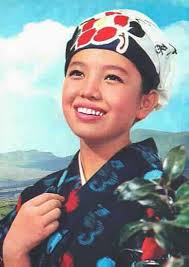Yao Su Rong may be considered one of Taiwan’s first superstars. She became famous during the late 60’s and was nicknamed 淚盈歌后 (tearful singing queen) because her voice often trembled as if she were crying while singing. Indeed, very many of her songs had to deal with sadness and heartbreak. Another distinctive quality is her very clear, highly enunciated Mandarin which creates her unique style. Although regarded as perhaps Taiwan’s greatest superstar of the 1960’s, I have gained the impression that she faded rather quickly and was no longer very much relevant by the late 70’s. Curious as to the reason for this, I realized I still did not know much about her life and did some research on her.
To begin, a brief explanation of a certain phenomenon under the martial rule of Chiang Kai Shek, which lasted from 1949-1975, is necessary. At this time the Kuomintang government exerted a great deal of control over the people of Taiwan and their daily lives. One such example is the policy of 禁歌,or songs banned by the government. Songs dealing with love between man and woman were generally looked down upon by the government as vulgar, as were sad songs which the Kuomintang feared would depress the public morale. It is no wonder, then, that almost 90 of “tearful” Yao Su Rong’s songs ended up being banned, including her 1967 smash-hit 負心的人 (Heartless Person).
The event that doubtless changed her career forever occurred in 1969, at the peak of Yao Su Rong’s fame. She had accepted the offer of a prominent nightclub in Kaohsiung to perform for a month, with 60,000 yuan as compensation. For reference, at this time the tuition of a private university in Taiwan was around 3,000 yuan. Naturally Yao Su Rong received many requests to sing her famous banned songs, which she had no choice but to politely decline. Then on the night of August 16th, 1969, Yao Su Rong succumbed to the audience’s pressure and sang “Heartless Person” for an adoring crowd. Unfortunately, once it was found out that Yao Su Rong had sung a banned song in a public performance, her singing license was revoked and she could no longer continue her singing career in Taiwan. She moved to Hong Kong shortly after.
Heartless Person
Cherry red lips, kisses like fire, all cannot hold a heartless person
Could it be that you are like a plant, impossible to touch the heart of.
I love you deeply, hate you deeply, all day drying my tears alone,
I regret, I regret, I regret being infatuated with you,
Ah, heartless person! Heartless person…
A tear of love, a broken heart, all cannot bring back a far-gone person
All the vows of yesterday are gone just like a spring dream.
I love you deeply, hate you deeply, in sadness my spirit is wounded, alone.
I regret, I regret, I regret wasting my youth.
Ah, heartless person! Heartless person…
Endless love turned into endless hate, in the end I’m left here alone,
hoping for you to come back soon, silently counting the days and nights.
I love you deeply, hate you deeply, if you trade your heart for mine you will finally know what it’s like to remember each other.
I regret, I regret, I regret waiting for you to this day.
Ah, heartless person! Heartless person…
Hate You to the Bone
The root of feeling is already destroyed, the seed of love already dried up
I hate you all the way to the bone.
I was foolish to put my life at stake, you turned out to be a swindler.
Exhausting my youth, sacrificing happiness, all I received in return is pain.
Hate you to the bone, hate you to the bone,
The tragedy already played out, the great error committed,
I hate you to the bone.
A fair maiden wandering with dried tears and dried blood,
I hate you all the way to the bone.
Injured by love, harmed by feelings, my life is like an extinguished candle.
A vast sea of people, a long and winding road, to where can I return?
Hate you to the bone, Hate you to the bone,
One wrong move and the whole game is lost,
I hate you to the bone.
Heart-breaking memories play before my eyes,
I hate you all the way to the bone.
I regret loving you so much, it tortures me to this day.
Silkworms make thread and are ensnared in their own trap, to whom can I tell my sadness?
Hate you to the bone, hate you to the bone,
To the end of the earth and sea, until the end of time,
I hate you to the bone.

